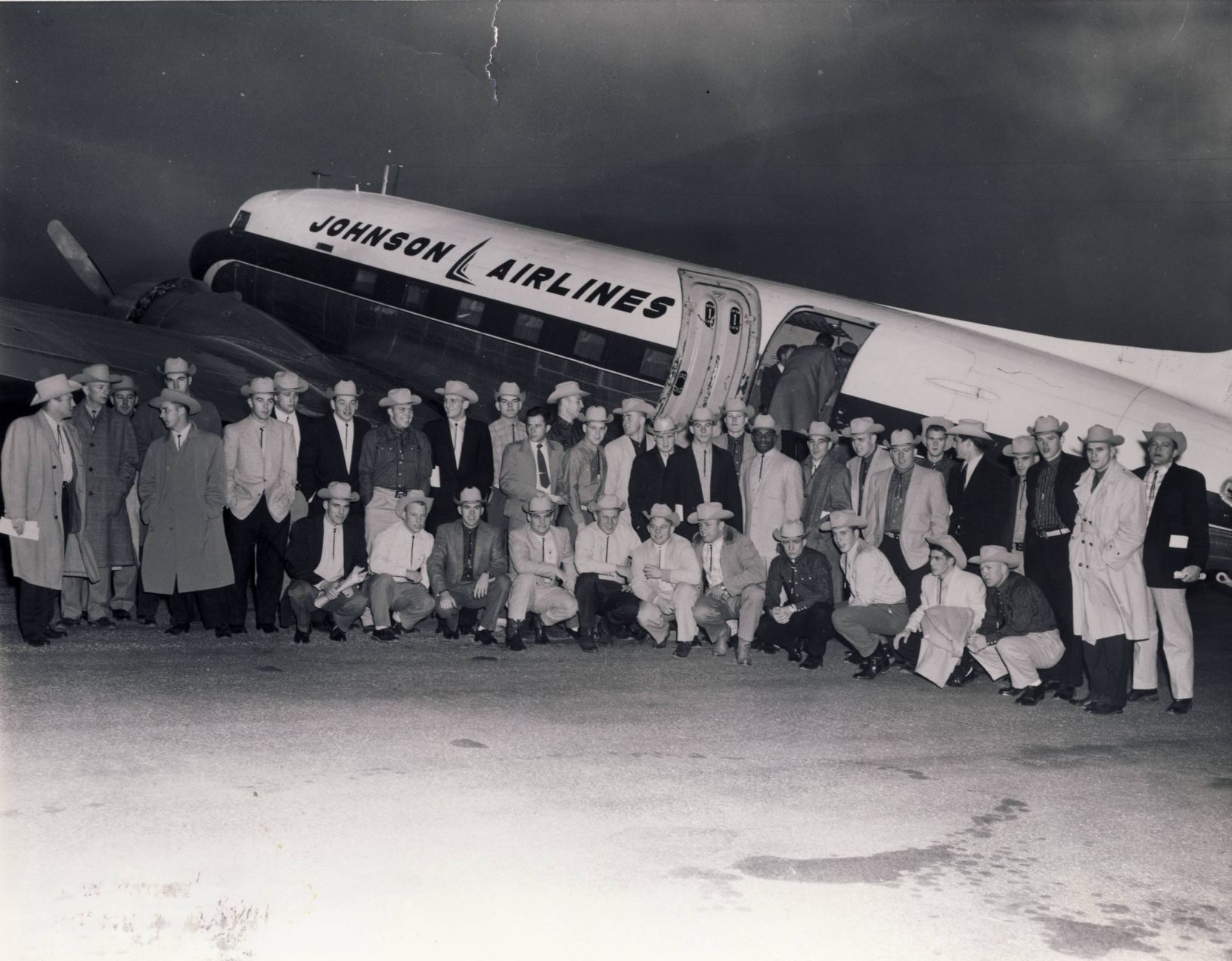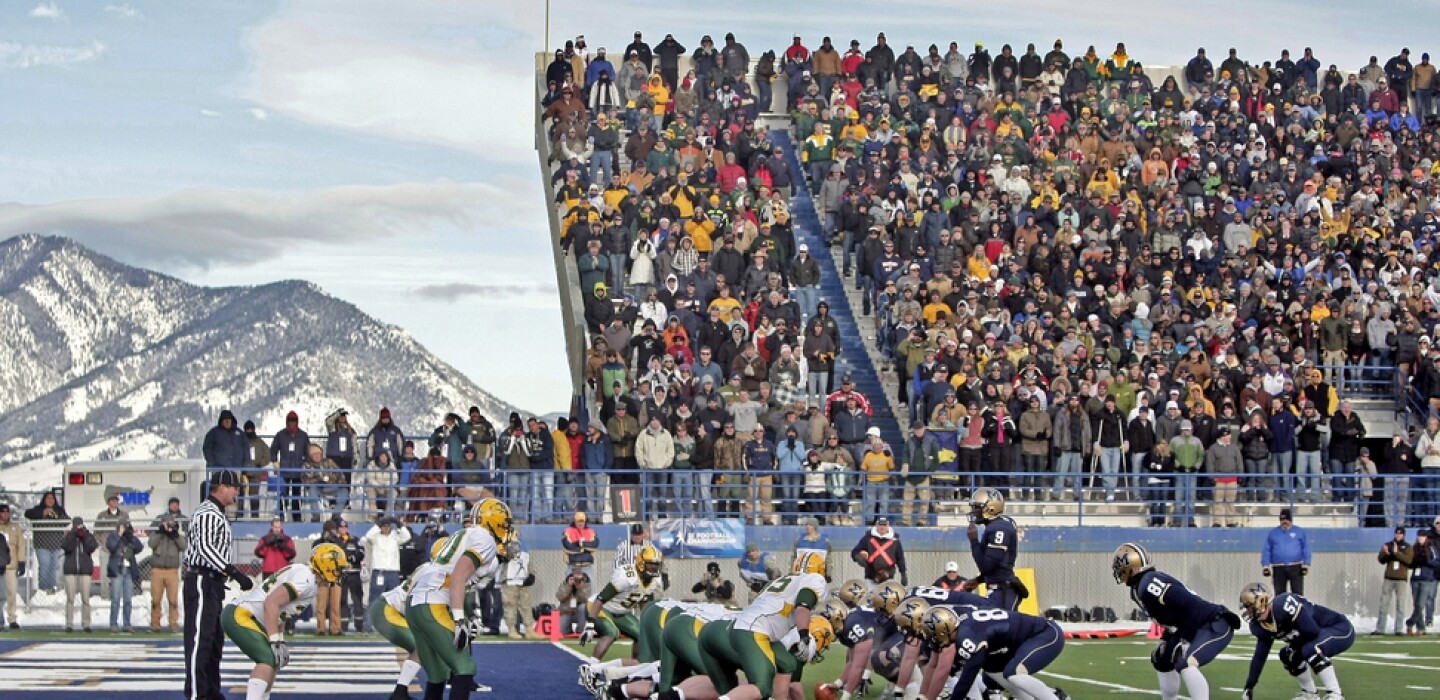Montana State Head Coach Brent Vigen Knows A Thing Or Two About Bison, Frisco
BOZEMAN, Mont. – The storylines are almost endless as Montana State prepares to play perennial kingpin North Dakota State to determine the FCS national champion.
Montana State and North Dakota State will renew their rivalry on Jan. 8 and the stakes will be much higher than any previous encounters.
The Bobcats currently own a 21-15 advantage in the series between the two schools separated by just 750 miles.
When the NCAA created three divisions in 1973 to align schools with similar philosophies, competition and athletic opportunities, the Bobcats and Bison quickly became the standard bearers in small college football and the rivalry, which began in 1914 and dominated by MSU in the early years, took on an added luster.

The first memorable matchup between the two schools took place in 1976 on a bitterly cold afternoon in Fargo as MSU prevailed 10-3 in a semifinal playoff game. It was the second win of the season for Montana State against the Bison that year – the Bobcats had posted a convincing 34-7 win in the second game of the 1976 season in Bozeman.
The playoff win over the Bison propelled the Bobcats, coached by Sonny Holland, into the national title game where they defeated Akron 24-13 to claim their only D-II national title.
Montana State finished 12-1 that season with its only loss coming one week after defeating NDSU during the regular season when Fresno State downed the Bobcats 24-10 in Fresno. The Bison ended the year at 9-3 with two of those losses coming at the hands of the Bobcats.

A short time later, Montana State, and the rest of the Big Sky Conference, reclassified to I-AA (what is now FCS). The Bobcats added the school’s third national championship in 1984 when Dave Arnold’s MSU team defeated Louisiana Tech 19-6 to win the I-AA national title.
Montana State is the only college football program with national championships in three divisions. The first title came in 1956 when the Bobcats, under the direction of Tony Storti, shared the NAIA title with St. Joseph’s (Ind.) after the two schools battled to a scoreless tie in the championship game. The 1956 Bobcats went 9-0-1 and won the Rocky Mountain Athletic Conference championship. They averaged 35 points per game on offense, and limited opponents to eight points per game on defense. (Sonny Holland, the head coach from Butte who would later guide the Bobcats to the D-II National Championship, played center on that team.)

NDSU, meanwhile, remained a member of the North Central Conference and dominated the league and all of Division II football for more than two more decades. The Bison, who had been voted College Division national champions on three occasions (1965, 1968-69), won five NCAA Division II titles in a span of eight years as Don Morton, Earle Solomonson and Rocky Hager joined Darrel Mudra and Ron Erhardt as coaches to lead the Bison to national championships.
Morton guided the Bison to the title in 1983 while Solomonson (1985-86) and Hager (1988, 90) each won two titles while at the school.
The Bison own two straight playoff wins over the Bobcats (2018-19) by a combined 94-24 score. Both of those wins have come inside the Fargodome.
The Bison, since transitioning to I-AA in 2005, have made the postseason their home since becoming eligible for the playoffs in 2011. NDSU has won eight national titles and will be shooting for the 17th overall title in program history with a win over the Bobcats.
Montana State has spent nearly half a century panning for another national title in football and it’s taken a graduate of North Dakota State to lead the Bobcats to the threshold of achieving that goal.
Montana State head football coach Brent Vigen was a two-year starter at tight end for North Dakota State. He was a member of three NDSU teams (1994-95, 1997) that appeared in the NCAA Division II playoffs and later became an assistant coach at his alma mater when Craig Bohl replaced Bob Babich in leading the Bison program.
All Bohl and Vigen did was lay the foundation of success that has followed since 2003 when the school made the transition to I-AA football from Division II, experiencing strong success almost immediately. He remained on Bohl’s staff at NDSU through the 2013 season as the Bison won the first of three straight FCS national titles with Vigen as the Bison’s offensive coordinator.

Vigen followed Bohl to Wyoming for the next seven seasons, despite being mentioned as a serious candidate for several other head coaching positions before electing to stay with the Cowboys.
Ultimately Vigen, a native of Buxton, N.D., a tiny community of 323 between Fargo and that other FCS school in the Peace Garden State, would accept his first head coaching job this fall in Bozeman.
“I knew for the last few years that the time was coming,” Vigen said in becoming a head coach for the first time. “When (former MSU coach) Jeff Choate was being mentioned as a possible candidate at Boise State I began to seriously think about Montana State.”
Different this time around was the fact Vigen recruited Montana State as much as the school pursued him for the head coaching role.
“(MSU) was on my short list of schools,” Vigen acknowledged. “In researching the (school) president and athletic director and football program, I thought Montana State would be the place where similar philosophies could be aligned,” he said. “This just seemed like the right opportunity.”
But not even Vigen or other school officials could have predicted the level of success in such a short period of time with a new coach.
Vigen’s first season has been one for the ages as the Bobcats enter the title game with a 12-2 record.
They began the season with a narrow 19-16 loss to Wyoming in Vigen’s first game since moving from Laramie. The Bobcats quickly found the winning track and reeled off nine straight wins before ending the regular season with a 29-10 setback to arch-rival Montana. They have knocked off Sam Houston State and South Dakota State in the playoffs to reach the title game.
“Leaving NDSU was difficult,” Vigen said. “I spent 21 years there and it’s where I met my wife.”

His wife, Molly, played basketball at NDSU under Hall of Fame coach Amy Ruley and was a member of the 1996 team that won the NCAA Division II national title for a fourth consecutive season and the fifth in a span of six seasons.
“Bozeman is a real special place,” he said. “Our guys, our program and our fans all seem to realize the challenge that lies ahead of us … and seem committed to achieving some real special things the right way.”
The national championship game will cap three weeks of preparation since MSU defeated South Dakota State in the semifinal round to set up the historic matchup between the program Vigen helped develop and his new program.
Vigen was on the NDSU staff when the Bison ventured into Bozeman and came away with one of the most memorable victories in the history of the NDSU program which was playing in just its second playoff game since transitioning to 1-AA.
The Bison, who had downed Robert Morris 43-17 one week earlier, surprised the Bobcats to win 43-17. Vigen and the Bison would see their playoff run come to an end the following week. NDSU has lost just two other playoff games since 2010.
The atmosphere on playoff football in Bozeman and the similar festivities in Frisco that Vigen is familiar with still resonate.

“I remember the game in 2011 and how appreciative we were to have the opportunity to play in the playoffs,” said Vigen, who will call upon his previous trips to Frisco while with the Bison to help calm the nerves of his Bobcats this time around.
“The most important part of the three weeks of preparation for the (title) game is the two and a half weeks we spend at home getting ready,” he said. “The time in Frisco will be more about how we spend our time. I know the layout of the area around the stadium and the stadium itself.
“It’s all going to be on me to make sure we spend our time wisely and in the most productive way,” he added.
The national championship game will bring to a close an improbable period of time that will see the MSU coach begin and end his first season as a head coach against two schools where he virtually grew up and cut his teeth in the coaching profession.
“There was a pretty good build up from February after taking the job to September when we opened against Wyoming,” Vigen said. “That has been nothing compared to what has been going on since winning against South Dakota State.”

A native of Bismarck, N.D., Ray is a graduate of North Dakota State University where he began studying athletic training and served as a student trainer for several Bison teams including swimming, wrestling and baseball and was a trainer at the 1979 NCAA national track and field championship meet at the University of Illinois. Ray later worked in the sports information office at NDSU. Following his graduation from NDSU he spent five years in the sports information office at Missouri Western State University and one year in the sports information at Georgia Tech. He has nearly 40 years of writing experience as a sports editor at several newspapers and has received numerous awards for his writing over the years. A noted sports historian, Ray is currently an assistant editor at Amateur Wrestling News.



